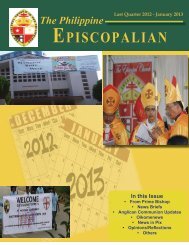read issue - Episcopal Church in the Philippines
read issue - Episcopal Church in the Philippines
read issue - Episcopal Church in the Philippines
Create successful ePaper yourself
Turn your PDF publications into a flip-book with our unique Google optimized e-Paper software.
“Will you go and do likewise?”<br />
Most Rev. Kathar<strong>in</strong>e Jefferts Schori<br />
The <strong>Episcopal</strong> <strong>Church</strong> (USA)<br />
br<strong>in</strong>g you greet<strong>in</strong>gs from The <strong>Episcopal</strong> <strong>Church</strong>.<br />
I We’re engaged <strong>in</strong> God’s mission <strong>in</strong> about 7000<br />
congregations <strong>in</strong> 16 nations – <strong>in</strong> Taiwan and Micronesia,<br />
Honduras, Ecuador, Colombia, Venezuela, Haiti,<br />
<strong>the</strong> Dom<strong>in</strong>ican Republic, Austria, Belgium, France,<br />
Germany, Italy, Switzerland, Puerto Rico, <strong>the</strong> Virg<strong>in</strong><br />
Islands, as well as <strong>the</strong> United States. We have been<br />
known as <strong>the</strong> Domestic and Foreign Missionary Society<br />
s<strong>in</strong>ce <strong>the</strong> early 1800s and we cont<strong>in</strong>ue to try to live <strong>in</strong>to<br />
that identity, know<strong>in</strong>g that God calls us to bridge all <strong>the</strong><br />
borders that divide and separate human be<strong>in</strong>gs. This<br />
season of Epiphany rem<strong>in</strong>ds us that Jesus crossed<br />
<strong>the</strong> border between heaven and earth for <strong>the</strong> sake of<br />
all families, languages, peoples, and nations. We are<br />
sent to do <strong>the</strong> same k<strong>in</strong>d of border-cross<strong>in</strong>g work. This<br />
morn<strong>in</strong>g’s celebration is an important example, as <strong>the</strong><br />
IFI and <strong>the</strong> ECP cont<strong>in</strong>ue to move across borders that<br />
have separated people <strong>in</strong> <strong>the</strong> past. St. Jude’s even<br />
sits on <strong>the</strong> border between two dioceses, perhaps<br />
encourag<strong>in</strong>g <strong>the</strong> faithful to keep cross<strong>in</strong>g over! The<br />
relationships among our three churches are a fur<strong>the</strong>r<br />
witness to a divided world, and it’s clear that toge<strong>the</strong>r<br />
we have an ability to challenge <strong>the</strong> walls of <strong>in</strong>justice<br />
and violence that o<strong>the</strong>rs try to build <strong>in</strong> this country and<br />
beyond.<br />
The lepers <strong>in</strong> this morn<strong>in</strong>g’s <strong>read</strong><strong>in</strong>gs are stuck<br />
beh<strong>in</strong>d social borders. They are walled off from <strong>the</strong>ir<br />
communities, forbidden to cross <strong>in</strong>to “clean” territory.<br />
Maybe you’ve seen an air curta<strong>in</strong> <strong>in</strong> an architecturally<br />
<strong>in</strong>novative build<strong>in</strong>g. Those air curta<strong>in</strong>s are designed to<br />
separate <strong>the</strong> outside from <strong>the</strong> <strong>in</strong>side – usually to keep<br />
<strong>the</strong> temperature <strong>in</strong>side <strong>the</strong> build<strong>in</strong>g more constant, to<br />
save energy and keep <strong>the</strong> air cleaner. Clean rooms for<br />
surgery or manufactur<strong>in</strong>g computer chips are similarly<br />
designed to keep <strong>the</strong> <strong>in</strong>side environment sterile.<br />
Naaman and <strong>the</strong> leper <strong>in</strong> <strong>the</strong> gospel live <strong>in</strong> a<br />
hermetically sealed world like that, shut away from<br />
neighbors by an <strong>in</strong>visible wall, only <strong>the</strong>y’re on <strong>the</strong><br />
outside, look<strong>in</strong>g <strong>in</strong>. Their sk<strong>in</strong> diseases give very public<br />
evidence of <strong>the</strong>ir uncleanness, and <strong>the</strong>ir societies have<br />
walled <strong>the</strong>m off from <strong>in</strong>teraction with so-called “clean”<br />
and “normal” people. Be<strong>in</strong>g unclean is much more<br />
a social disease than a physical one. In <strong>the</strong> ancient<br />
world <strong>the</strong>re were o<strong>the</strong>r ways of be<strong>in</strong>g unclean that<br />
couldn’t be seen by your neighbors. The lepers know<br />
<strong>the</strong>y are judged unclean, and if you <strong>read</strong> carefully,<br />
Presid<strong>in</strong>g Bishop Kathar<strong>in</strong>e Jefferts Schori preached dur<strong>in</strong>g<br />
her visit at <strong>the</strong> St Jude’s <strong>Episcopal</strong> <strong>Church</strong> <strong>in</strong> Bangao, Buguias,<br />
Benguet on February 12, 2012<br />
you’ll discover that <strong>the</strong>y ask to be cleansed, ra<strong>the</strong>r than<br />
healed. The varieties of uncleanness are evidenced<br />
by <strong>the</strong> requirement that <strong>the</strong>ir newly clean state be<br />
certified before <strong>the</strong>y’re permitted to rejo<strong>in</strong> society. It<br />
isn’t enough just to look good.<br />
T he ancient world had a well-def<strong>in</strong>ed system for<br />
divid<strong>in</strong>g up <strong>the</strong> world, with societies divided <strong>in</strong>to<br />
categories like clean and unclean, sacred and profane,<br />
shamed and dignified (or perhaps someth<strong>in</strong>g like<br />
‘appropriately proud’). In those days, people were<br />
afraid of pollution, both physical and spiritual, and <strong>the</strong><br />
th<strong>in</strong>gs you were supposed to stay away from were well<br />
known – dead people, women, foreigners, Samaritans.<br />
We would recognize some of those categories today:<br />
foreigners, immigrants, adherents of o<strong>the</strong>r religious<br />
traditions, people from <strong>the</strong> “wrong” families or parts of<br />
town. Adults divide up <strong>the</strong> world like that, and children<br />
do it, too – you can watch <strong>the</strong>m chalk off <strong>the</strong> playground,<br />
often by gender and <strong>in</strong>-groups vs. out-groups.<br />
Naaman is a powerful military leader, but he’s <strong>in</strong><br />
trouble because people can see he’s got a sk<strong>in</strong> disease<br />
– and someth<strong>in</strong>g visible like eczema or psoriasis<br />
gives o<strong>the</strong>rs <strong>the</strong> idea that <strong>the</strong>re must be someth<strong>in</strong>g<br />
dangerous about him, and <strong>the</strong>y shouldn’t get too close.<br />
He just might have an evil spirit that will <strong>in</strong>fect us!<br />
The gospel leper wants to be clean more<br />
than anyth<strong>in</strong>g else – he comes on his knees. He and<br />
Naaman go look<strong>in</strong>g for restorers, people who will make<br />
<strong>the</strong>m clean and once aga<strong>in</strong> fit for community <strong>in</strong>teraction.<br />
They want to be restored to relationship.<br />
cont<strong>in</strong>ued next page<br />
The Philipp<strong>in</strong>e EPISCOPALIAN 3




